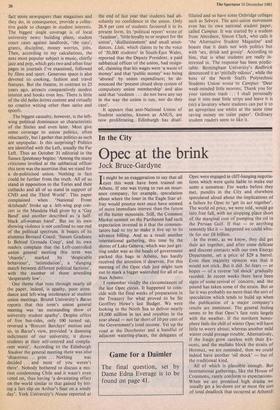The press
Et in Arcadia ego
Paul Johnson
What student magazines do today, Fleet Street does tomorrow. Or is it the op- posite? There's certainly a connection. Such publications are well studied by na- tional newsapers. For instance in May, when Signature of Exeter University, noting the tendency of dimmer Sloane Rangers to congregate there, and a cor- responding increase in the number of 'dropout students citing the social im- balance as a reason for abandoning their course', warned: 'Exeter looks like becom- ing a dustbin for Oxbridge failures', the na- tionals were fascinated. Many of them keep student newspaper editors or staff on ex- iguous retainers. Indeed, the Cambridge Stop Press claims that 'at least' two undergraduates at Jesus have been hired by Fleet Street solely to report on Prince Ed- ward and the people he chums up with.
Some of these mags lead quite sophisticated lives. Stop Press for example is locked in a reproductions rights battle with the New York Times and the Sunday Express over an article on Peru it commis- sioned. Nowadays they have quite big staffs, union subsidies on occasion, and ac- cess to modern print technology. 1 can't say the results are particularly impressive. The best looking are those which pursue a con- servative, Times-style typography and layout, like the Birmingham Post, organ of Aston University. The scruffiest looking, and not I think by coincidence, are those which are most markedly political, like Hull University's Hullfire, and Leeds Student and Sussex University's Speakeasy. But 1 don't want to sit in judgment. A survey of a score of these papers, from 15 universities, and ranging from the end of 1982 to this November, permits one only a very impres- sionistic set of conclusions, which I give for what they are worth.
Student mags used to imitate the Tatler or Punch, the New Statesman or Time. The models nowadays are different. A few look like trade union journals, as in a sense they are, revolving round NUS activities. Some imitate Private Eye. But the biggest in- fluence appears to be Time Out. Nearly all have pages of 'Listings' and the prime aim of the best of them is to tell the students what they need or want to know. That . seems to me an excellent trend. They are in
fact more newspapers than magazines and they do, in consequence, provide a collec- tive guide to changes in student interests. The biggest single coverage is of local university news: building plans, student court cases against landlords, 'the cuts', grants, discipline, money worries, jobs. Then, according to my calculations, the next most popular subject is music, chiefly jazz and pop, which gets two and often four pages in journals I've examined, followed by films and sport. Generous space is also devoted to cooking, fashion and travel features. But the theatre, in contrast to 25 years ago, attracts comparatively modest interest and books even less. There is little of the old belies let fres content and virtually no creative writing other than satire and spoofs.
The biggest casualty, however, is the left- wing political dominance so characteristic of the Sixties and even. later. Most give some coverage to union politics, often reluctantly, but I gather that politics as such are unpopular. Is this surprising? Politics are identified with the Left, usually the Far Left. Thus an October 31 editorial in the Sussex Speakeasy begins: 'Among the many criticisms levelled at the sabbatical officer this term was the assertion that we stand for a de-politicised union. Nothing in fact could be further from the truth. All of us stand in opposition to the Tories and their cutbacks and all of us stand in support of CND and the Third World'. This paper complained when 'National Front skinheads' broke up a left-wing pop con- cert in the Mandela Hall given by a 'Gay Band' and another described as 'a half- black all-woman band'. But on its own showing violence is not confined to one end of the political spectrum. It boasts of its alumnus Bernard Coard: 'Sussex Graduate Is Behind Grenada Coup', and its own readers complain that the Left-controlled union general meeting this term was
'chaotic', marked by 'despicable behaviour', 'intimidation', a 'slanging match between different political factions', with the number of those attending 'desperately low'.
One theme that runs through nearly all the paper, indeed, is apathy, poor atten- dance and left-wing intolerance at student union meetings. Bristol University's Bacus reports that this term's union general meeting was 'an outstanding show of university student apathy'. Despite offers of free bus-rides, only 100 turned up, reversed a 'Boycott Barclays' motion and so, in Bacus's view, provided 'a damning indictment of our university, it shows students at their self-centred and compla- cent worst'. According to the Edinburgh Student the general meeting there was also 'disastrous ... grim ... Nothing was decided ... and most of you weren't there'. Nobody bothered to discuss a mo- tion condemning Chile and it wasn't even voted on, thus having 'a devastating effect on the world similar to that gained by lett- ing a fart slip on Arthur's Seat on a windy day'. York University's Nouse reported at the end of last year that students had ab- solutely no confidence in the union. Only 26.9 per cent of students favoured it in its present form. Its 'political report' wrote of 'fatalism', 'little loyalty to or respect for the union', 'disillusionment' and small atten- dances. Llais, which claims to be the voice of '30,000 students' in South-East Wales, reported that the Deputy President, a paid sabbatical officer of the union, had resign- ed, claiming that his wages were 'a waste of money' and that 'public money' was being 'abused' by union expenditure; he de- nounced the 'present closed shop system of compulsory union membership' and also said that 'students ... do not have any say in the way the union is run, nor do they care'.
It appears that anti-National Union of Student societies, known as ANUS, are now proliferating. Edinburgh has disaf-
filiated and so have some Oxbridge colleges such as Selwyn. The anti-union movement even has its own national student paper, called Campus. It was started by a student from Aberdeen, Simon Clark, who calls it 'the Alternative Student Magazine' and boasts that it deals not with politics but with 'sex, drink and gossip'. According to him, that is what students are really in- terested in. The response has been predic- table. Birmingham University's Redbrick denounced it as 'pitifully odious', while the boss of the North Staffs Polytechnic Students Union wrote to Campus: 'Dear weak-minded little morons, Thank you for your tasteless trash ... I shall personally tear it into neat little strips and leave it is (sic) a lavatory where students can put it to an apropriate use whilst at the same time saving money on toilet paper'. Ordinary student readers seem to like it.















































 Previous page
Previous page